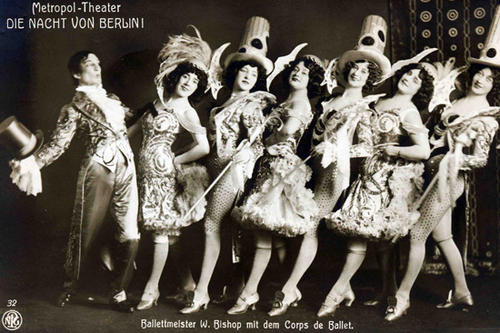Amusement at Court and in Rear Courtyards
Researchers at the Friedrich Meinecke Institute of History study how residents of Berlin celebrated around 1900
Dec 16, 2010
The revue "The Night of Berlin" was performed in 1911 in the Metropolitan Theatre, Behrenstraße, now the location of the Komische Oper.
Image Credit: Rembrandt, Berlin /Institut für Theaterwissenschaft, Freie Universität, Theaterhistorische Sammlung Walter Unruh.
Movies, dance, and theatre – the cultural metropolis of Berlin that we know today got its start about 100 years ago: As industrialization progressed, people streamed into the city from Germany and elsewhere, looking for work – and play. Where and how people celebrated in Berlin around 1900, and what people did for amusement in London or New York, is the subject of research by a group at the Friedrich Meinecke Institute of History at Freie Universität Berlin.
“Metropolitan Areas and the Culture of Amusement. Berlin in a transnational comparison, 1880 – 1930” is the name of the project, funded by the German Research Foundation (DFG) within the Modern and Contemporary History Division headed by Professor Paul Nolte and Dr. Daniel Morat. Based on old newspaper articles, postcards, manuscripts, theatre schedules, and memoirs of important mimes, the researchers are reconstructing the world of amusement as it was back then, illuminating its social and political importance.
Alongside courtly theatre, opera, and operettas, the era also saw the development of musicals and revues, street artists enlivened the back courtyards of working-class districts, and a huge number of hotels, restaurants, and cafés promised an evening’s amusement. As the city’s population grew, so did audiences and audience members’ desire to participate in public life; modern mass society had been born.
With this as background, the group of researchers is studying how big-city life and cultural offerings were mutually dependent, how the entertainment sector shifted from small family businesses to major corporations, and what kind of potential conflicts cultural life in Berlin entailed: New ideas often triggered heated debate and were derided as “dirt and trash” (Schmutz und Schund).
The head of the project, historian Daniel Morat, is studying the “culture of listening in the big city,” which has to do with music in public space in the Berlin metropolitan area. His team is setting new trends with three dissertations. Tobias Becker, also a historian, is studying popular, commercial theaters of the day in Berlin and London to determine how economic and social factors affected stage productions. Historian Johanna Niedbalski is diving into the world of the amusement parks that existed around 1900, with their carnival rides, fireworks, dance contests, and boxing matches, for her research, which also encompasses finding out what parts of this scene can still be found in Berlin. Theatre studies student Anna Littmann is devoting her time to studying amusement at court, using old theatre schedules and other materials to reconstruct how the politics and aesthetic preferences of the ruling class affected cultural activities in the metropolitan regions.
Berlin lies at the heart of the research, with comparisons made between the great German metropolis and both London and New York. A major boom in the entertainment sector occurred in these three cities at that time. Plus, competition among the cities themselves sparked greater activity in the business, with ideas and repertoires shuttling back and forth across the English Channel and even the Atlantic – many of which have retained their draw to this day. Take the operetta “Im Weißen Rößl” (The White Horse Inn), for instance: Following its premiere in Berlin in November 1930, it was fêted on Broadway a short time later, while the Nazi regime banned it in Germany. The piece was just recently performed again at the Komische Oper in Berlin.
Further Information
Dr. Daniel Morat, Friedrich Meinecke Institute
Email: daniel.morat@fu-berlin.de
Tel.:+49 (0)30 / 83852764

